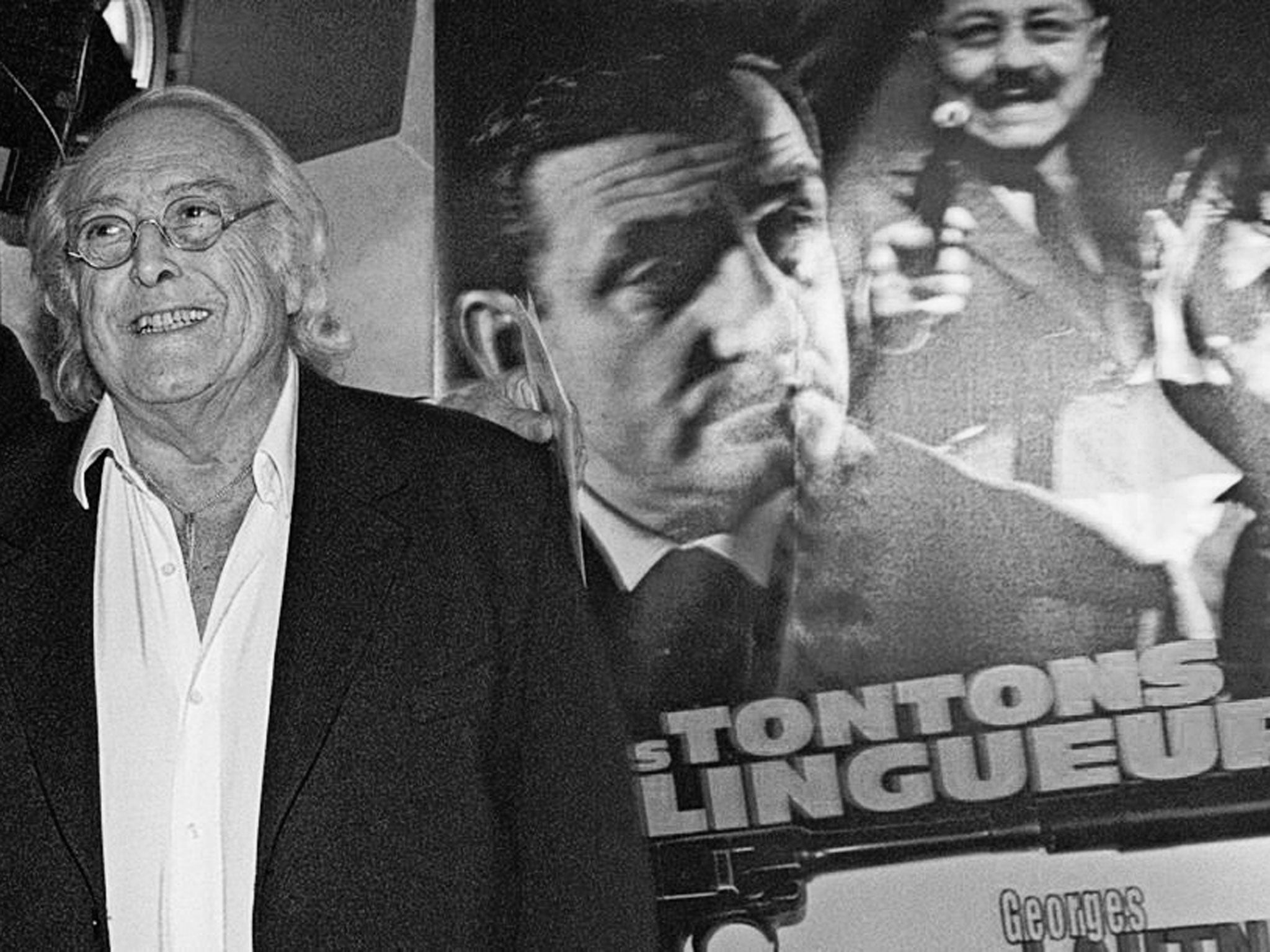Georges Lautner: Director acclaimed for his crime comedies who worked with Jean Gabin, Alain Delon and Jean-Paul Belmondo

The subversive humour and razor-sharp dialogue of the crime comedies Georges Lautner directed in the 1960s was often lost in translation, but in his native France they enjoyed a popularity comparable to the Ealing comedies in Britain. Des Pissenlits Par La Racine (Salad By The Roots, 1964), Les Barbouzes (The Great Spy Chase, 1964) and Les Bons Vivants (co-directed with Gilles Graingier, 1965) featured a revolving cast of character actors beloved of French audiences – Bernard Blier, Francis Blanche, Robert Dalban, Jean Lefebvre, Lino Ventura – and became a staple of television schedules.
However, Les Tontons Flingueurs (known as Crooks In Clover or Monsieur Gangster, with all the aforementioned talent, 1963) outshone them all and grew from attracting half a million Parisian cinema-goers in its first six months into a cross-generational cult movie still pulling a 20 per cent audience share in December 2012. It was shown by France 2 on Sunday as a tribute to the director, who also worked with Jean Gabin, Alain Delon and Jean-Paul Belmondo.
Adapted by Lautner, Michel Audiard and Albert Simonin from his own thriller Grisbi Or Not Grisbi – a Shakespearean pun on one of the many French slang words for money – Les Tontons Flingueurs transcended its standard plot of a "retired" hoodlum coming to the aid of a dying former accomplice and fighting off various factions to reach a level of surrealism and irreverence unusual for the genre at the time. Lautner's trademark technique of close-ups and tight edits, combined with Audiard's riff-fuelled, ratatatat dialogue, gave his films a manic quality and frantic energy and influenced directors like Quentin Tarantino.
Born in Nice in 1926, he was the son of the actress and singer Renée Saint-Cyr – who would go on to portray a succession of upper crust ladies in his films – and a jeweller and daredevil plane pilot who died in an airshow crash in 1938. His mother continued acting during the Second World War, and the teenage Lautner accompanied her on film lots and became enthralled by the medium. He did odd film jobs, including set design, and spent much of his military service as a cinema projectionist in Austria and then working for the French army documentary unit. This grounding stood him in good stead and he became second assistant-director to Sacha Guitry when the monstre sacré of French theatre and cinema needed an all-rounder in 1949 while he starred in and directed the redemptive Le Trésor De Cantenac.
Lautner appeared with his mother in the Foreign Legion epic Capitaine Ardant but realised he was too shy to persevere with acting and decided to concentrate on the technical side of film-making. He became adept at working with a tight budget and developed a lasting rapport with extras and supporting actors, traits which proved helpful in his transition to directing and screenwriting. His first film, La Môme Aux Boutons (1958), was a flop but he redeemed himself with the spy thriller Marche Ou Crève (literally "Walk Or Die"), starring Bernard Blier, an actor he directed time and again, including in the procedural thriller Le Septième Juré and Lautner's first popular success, the spy comedy Le Monocle Noir (1961).
Blier recommended Lautner to Alain Poiré, boss of the French production power house Gaumont International, who entrusted him with Les Tontons Flingueurs. Gabin was attached to the production but didn't see eye to eye with Lautner who decided to proceed with Ventura taking over. The different dynamic and brooding intensity Ventura brought to the film contributed to the enduring popularity of Les Tontons Flingueurs, which has become a cornerstone of French popular culture, spawning books and references galore on websites and in everyday parlance. Lautner worked with Gabin on Le Pacha (Pasha, 1968) and introduced the veteran actor to a different approach to film-making while still allowing him the occasional trademark screen outburst.
Lautner had a knack for discovering new talent and helped launch Mireille Darc to a career as one of France's biggest sex symbols of the late 1960s and '70s as she graduated from decorative roles in his crime comedies like Ne Nous Fâchons Pas (Let's Not Get Angry, 1966) to sexually-charged and seductive performances in Galia (1966), La Grande Sauterelle (1967) and Les Seins De Glace (Icy Breasts, 1974). He also cast the French stand-up comic Coluche his first film role in Laisse Aller, C'est Une Valse (Troubleshooters, 1974).
Lautner was critical of the Nouvelle Vague cinema of François Truffaut and Jean-Luc Godard saying it was "more vague than nouvelle." His sole English-language film, the intriguing Road To Salina, starring Rita Hayworth and filmed in Lanzarote, failed to grab audiences outside France. He directed Alain Delon in the tense police drama Mort D'un Pourri (Death Of A Corrupt Man, 1977) and Jean-Paul Belmondo in several of his more successful action films, Flic Ou Voyou (1979), Le Guignolo (1980), Le Professionel (1981) and Joyeuses Pâques (1984). Lautner made the last of his more than 40 films, the gritty crime drama L'Inconnu Dans La Maison (Stranger In The House) with Belmondo in 1992. He published his autobiography, On Aura Tout Vu ("We Have Seen Everything") in 2005.
Georges Lautner, film director and screenwriter: born Nice 24 January 1926; married; died Paris 22 November 2013.
Subscribe to Independent Premium to bookmark this article
Want to bookmark your favourite articles and stories to read or reference later? Start your Independent Premium subscription today.

Join our commenting forum
Join thought-provoking conversations, follow other Independent readers and see their replies